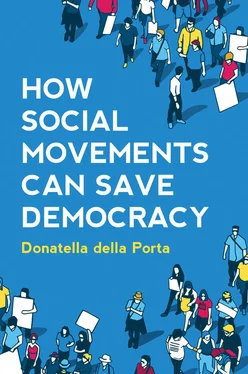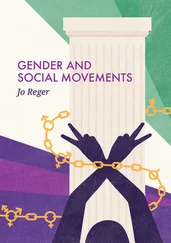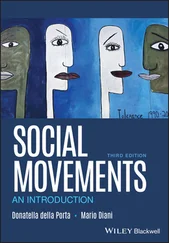As I have suggested elsewhere (della Porta 2013), the legitimation of really existing democracies required certain specific conditions that are less and less present nowadays. First of all, mass political parties allowed for linking delegation with some form of participation by citizens, contributing towards making representatives accountable in a long-term perspective (Pizzorno 1993). In addition, the majoritarian assumption needed a nation state, defining the border of the demos in whose name (and interest) decisions were made. Finally, even though representative democracy did not call for social equality, it still relied upon the assumption that political equality would reduce social inequality, which otherwise risks challenging the very principle of free access to political rights. The representative form of democracy developed, that is, in contexts characterized by party democracies, national sovereignty and well-established welfare states.
The weakening of political parties, nation states and welfare provisions has altered the functioning of representative democracies, but it may also have produced some opportunities for experimenting with other conceptions of democracies. In particular, it stresses the importance of involving citizens in the democratic process. As Pierre Rosanvallon (2006, 12–18) has suggested, in the evolution of democracy a circuit of oversight anchored outside of state institutions has developed, along with the institutions of electoral accountability. Growing societal powers of sanction and prevention have been reflected in an increasing organization of distrust.
In sum, the democratic innovations analysed here are justified by the belief that, in times of economic, social and political crises, more rather than less citizens’ participation is needed. As a democratic malaise is fuelled by an increasingly elitist development within really existing democracies – particularly in their post-democratic version – what we need to restore democratic legitimacy and efficacy (on the input and the output side) is more involvement of citizens. Participation is not only essential to restoring trust in institutions, but is also a way to develop good citizenship. Crises require, and at the same time open opportunities for, change. Prefiguration of democratic participation is therefore even more important in and outside public institutions.
The backlash against democracy that is fuelled by right-wing populism cannot be addressed by declaring the people unfit for civic life and calling for technocratic solutions. Rather, an ‘age of mistrust’ requires an institutional adaptation that can transform challenges into resources. Social movements (along with judges and independent authorities), as instruments of external control and permanent contestation, act in what Pierre Rosanvallon (2006, 20) calls counter-democracy – that is, a set of formal and informal checks and balances, as well as counterpowers, that make sure that ‘society has a voice, that collective sentiments can be articulated, that judgments of the government can be formulated, and that demands can be issued’.
Against this background, as I am going to argue in the next section of this introduction, progressive social movements are to be considered as promoters of democratic innovations that can improve participation and deliberative qualities. In this direction, the volume focuses on the involvement of progressive social movements in the ideation and implementation of innovations in institutional politics, addressing their potential but also the limitations on their capacity to improve democracy. As with political parties or interest groups, so too social movements may have different attitudes towards democracy, in some cases supporting and in others challenging democratic institutions. In a moment in which concerns are increasing regarding the potential disruption of a Great Regression led by xenophobic movements and parties, I address instead the potential for alternative politics and policy that progressive social movements might contribute in the direction of a deepening of democracy.
Bridging social movement studies and democratic theory, I analyse some democratic innovations promoted by progressive social movements, especially in the direction of participatory and deliberative practices. Focusing on recent cases, the analysis will thus highlight the role that progressive social movements can play in times that are characterized by crises, but also by transformation.
Progressive social movements as sites for innovation
While social movements have been studied especially as contentious actors, mainly taking to the streets to resist or promote political changes, some research has pointed towards their innovative capacity in terms of nurturing and spreading new ideas – about, among other things, democratic institutions. Traditionally considered as actors ‘at the gate’ of the institutional system, social movements instead enter institutional arenas in various forms and through various channels.
Social movements have been considered as important actors in terms of their capacity to ‘take the floor’, building public spheres and participating in them. Clearly, not all social movements promoted democracy: some movements (particularly right-wing movements) have openly declared themselves anti-democratic; others (including left-wing movements) have produced authoritarian turns. There is, however, as Charles Tilly (2004, 125) has pointed out:
a wide correspondence between democratisation and social movements. The roots of social movements are found in the partial democratisation that moved British subjects and the North-American colonies against those that governed them in the 18th century. Throughout the nineteenth century, social movements generally blossomed and developed wherever further democratisation took place, decreasing when authoritarian regimes impeded democracy. This path continued during the twentieth and twenty-first centuries; the maps of the development of institutions and social movements widely overlap.
If democratization favoured social movements, the majority of these supported the democratic reforms that promoted their development.
In this volume, I am primarily concerned with what we might call progressive social movements. Even though progress is a contested term (Allen 2016), I would retain it to define actors that struggle for an inclusive vision of a just society and for deepening democracy. In doing so, I do consider that progress has a dialectical nature. It has been used to stress human emancipation as opposed to social domination, but also criticized as justifying domination by implying ‘a universalist teleological form of thinking according to which some societies or groups have reached that telos earlier than others and thus have the authority, and maybe even the mission, to pull the less progressed people out of their “self-incurred immaturity” into the light of reason and freedom, possibly even overcoming their ignorant or indolent reluctance by force’ (Forst 2019, 1).
While acknowledging the tension between a normative meaning and its historical use, I follow Forst’s call for the development of a de-reified, non-teleological, non-dominating and emancipatory conception of progress. As he notes, differentiating between a technological vision of progress and moral–political progress:
the decisive question raised by the concept of moral–political progress remains how the power to define such progress and the paths leading to it is structured… Technological progress cannot count as social progress in life conditions without social evaluations of what it is good for, who benefits from it, and what costs it generates. Nor can true social progress as moral–political progress exist where the changes in question are enforced and experienced as colonization. Technological progress must be socially accepted, and socially accepted progress is progress which is determined and brought about by the members of the society in question. (Forst 2019, 1) 1
Читать дальше












